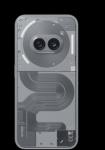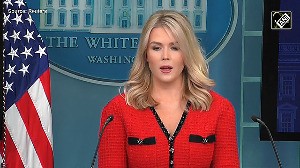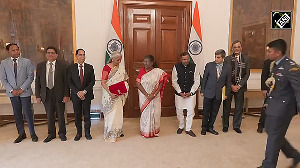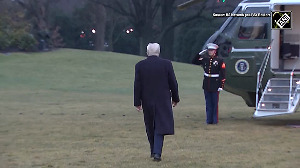The terrorists who attacked Mumbai in November last year were instructed on mobile phones by their Pakistani handlers -- to look for ministers and VIPs at the Hotel Taj Palace in Mumbai and take them as hostages -- before setting rooms on fire.
This was revealed on Friday in the Special Court, which is hearing the 26/11 trial, through CDs of four telephonic conversations between terrorists and their Pakistani handlers. The talks had been recorded by the police while intercepting the conversation between the terrorists and their handlers in Pakistan, Special Public Prosecutor Ujjwal Nikam informed the court.
A terrorist was told by the person on the other end to inform the families of the hostages at Hotel Taj that they should request the army to stop the operation if they wanted to see their loved ones alive. In another conversation, a terrorist was asked why they had not sunk the Kuber (the boat by which they came to Mumbai from Pakistan).
The terrorist replied that they had no time to do so, as another vessel approached them and they thought the Indian Navy was chasing them. The terrorists were also told that setting the rooms above them on fire would prevent the armed forces from reaching there by helicopter and they should ensure that the fire spreads as it would benefit them.
During the telephonic conversations, the names of three terrorists -- Abu Ali, Abu Umar and Abdul Rehman Bada -- had figured. It also appeared that another terrorist named Abu Shoeb was assisting them. On the other end of the line were Washibhai and Kafabhai.
Before the CDs were played, Parambir Singh, then additional commissioner of police, Anti-Terrorism Squad, told the court that he had granted sanction to intercept the telephonic talks the terrorists had with their Pakistani handlers, during the terror attacks in Mumbai. Singh said a subordinate officer in charge of service had informed them that terrorists were using four mobile phones and the police wanted to intercept the calls to find out with whom they were talking and about what.
Accordingly, Singh, who is the competent authority under the Indian Telegraph Act to accord such sanction, gave permission to intercept telephonic conversations of the terrorists.
The prosecution examined Singh as a witness to show the court that due procedure for the interception of telephone calls was properly followed, said Special Prosecutor Ujjawal Nikam.
The prosecution is relying on telephonic talks between terrorists and their handlers as evidence to show that Pakistan-based terror outfit Lashkar-e-Tayiba had carried out the Mumbai attacks. Only some portions of the CDs, containing telephonic conversations spanning 48 hours, were played in the court.







 © 2025
© 2025